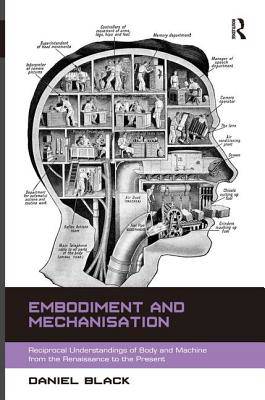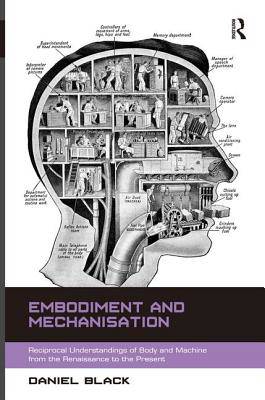
Door een staking bij bpost kan je online bestelling op dit moment iets langer onderweg zijn dan voorzien. Dringend iets nodig? Onze winkels ontvangen jou met open armen!
- Afhalen na 1 uur in een winkel met voorraad
- Gratis thuislevering in België vanaf € 30
- Ruim aanbod met 7 miljoen producten
Door een staking bij bpost kan je online bestelling op dit moment iets langer onderweg zijn dan voorzien. Dringend iets nodig? Onze winkels ontvangen jou met open armen!
- Afhalen na 1 uur in een winkel met voorraad
- Gratis thuislevering in België vanaf € 30
- Ruim aanbod met 7 miljoen producten
Zoeken
Embodiment and Mechanisation
Reciprocal Understandings of Body and Machine from the Renaissance to the Present
Daniel Black
Hardcover | Engels
€ 202,95
+ 405 punten
Uitvoering
Omschrijving
Drawing on philosophical, neurological and cultural answers to the question of what constitutes a body, this book explores the interaction between mechanistic beliefs about human bodies and the successive technologies that have established and illustrated these beliefs. At the same time, it draws upon newer perspectives on technology and embodied human thought in order to highlight the limitations and inadequacies of such beliefs and suggest alternative perspectives. In so doing, it provides a position from which widely held assumptions about our relationship with technology can be understood and questioned, by both showing how these presuppositions have emerged and developed, and examining the extent to which they are dependent upon our grasp of specific technologies. Illustrated with examples from the Renaissance and Enlightenment periods, as well as the industrial age and the recent eras of informatics, gene science and nanotechnology, Embodiment and Mechanisation highlights the ways in which technological changes have led to shifts in the definition of machine and body, investigating their shared underlying belief that all matter can be reduced to a common substance. From clockwork and cadavers to engines and energy, this volume reveals our long-standing fascination with and enduring commitment to the idea that bodies are machines and that machines are in some sense bodies. As such, it will appeal to scholars across the humanities and social sciences with interests in the sociology of science and technology, embodiment, cultural studies and the history of ideas.
Specificaties
Betrokkenen
- Auteur(s):
- Uitgeverij:
Inhoud
- Aantal bladzijden:
- 220
- Taal:
- Engels
Eigenschappen
- Productcode (EAN):
- 9781472415431
- Verschijningsdatum:
- 1/05/2014
- Uitvoering:
- Hardcover
- Formaat:
- Genaaid
- Afmetingen:
- 156 mm x 234 mm
- Gewicht:
- 489 g

Alleen bij Standaard Boekhandel
+ 405 punten op je klantenkaart van Standaard Boekhandel
Beoordelingen
We publiceren alleen reviews die voldoen aan de voorwaarden voor reviews. Bekijk onze voorwaarden voor reviews.











